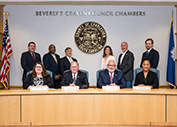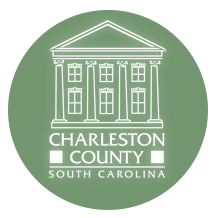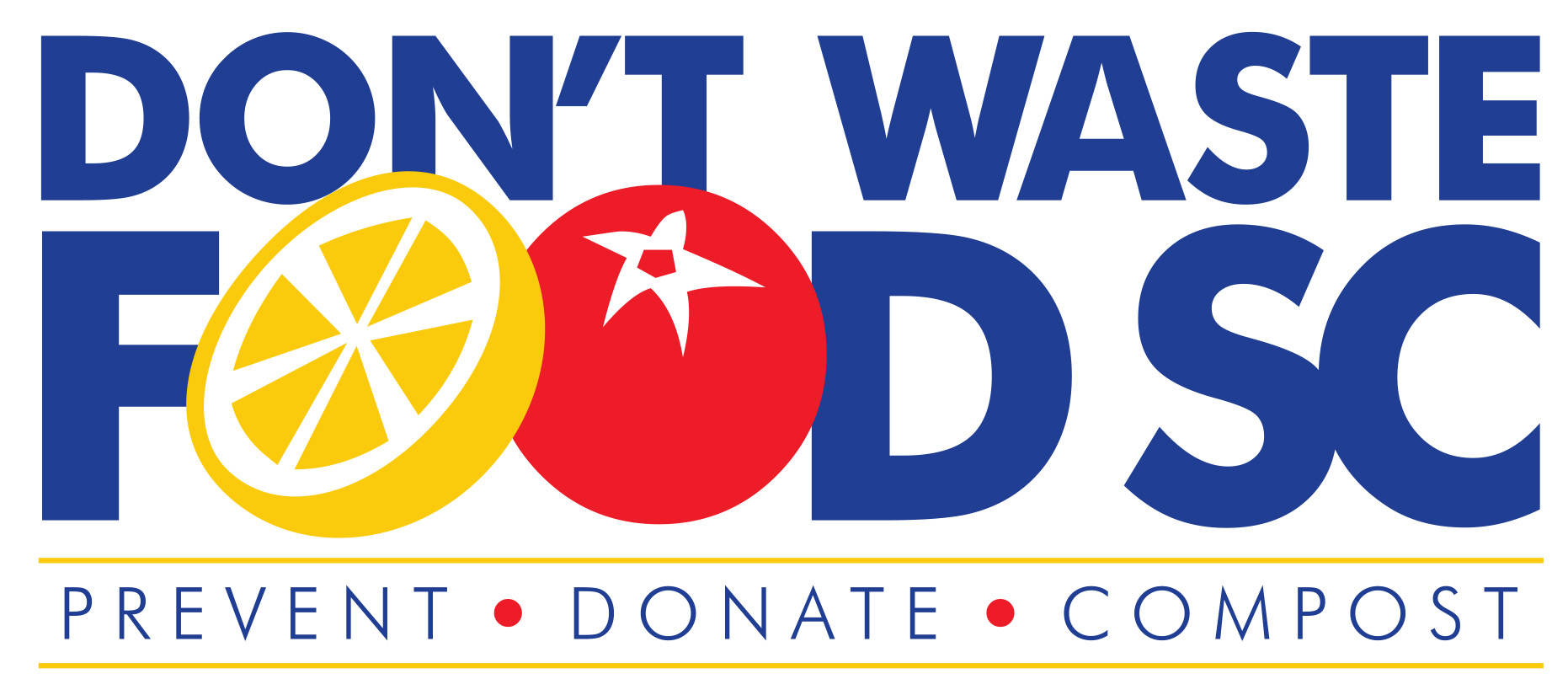Charleston County's Composting Program

Charleston County Environmental Management conducted a waste composition study in 2009-2010, revealing that over 20% of the County's waste stream consists of organics, such as yard waste and food scraps. Charleston County Council set a vision for saving valuable landfill space and recycling organic waste by maximizing the County's compost facility.
Charleston County began composting yard waste in 1993 and averaged about 20,000 tons per year. Today the compost facility is located in West Ashley and processes 100% of the yard waste generated and accepted at the landfill, nearly 75,000 tons a year. Additionally, the County was the first in the state to initiate food waste composting.
Charleston County's composting program is a vital part of the County's integrated solid waste management program and a key part of the County's goal to develop the premier solid waste management program in the Southeast. Diverting organic material for composting conserves landfill space and supports County Council's 40% recycling goal.
In January 2013, the program earned the U.S. Composting Council's (USCC) Seal of Testing Assurance (STA), which testifies that the finished compost consistently meets that program's high quality standards. Two years later at the USCC conference in Austin, Texas, Charleston County was awarded the 2014 USCC Compost of the Year Award.
In 2020, the compost facility was privatized through a partnership with McGill Environmental Systems.
School Compost Donation Program

McGill is proud to be part of the Charleston County community. Charleston County Schools can contact us at beesbest@mcgillcompost.com to inquire about compost donations or discounts for use in projects throughout the district. Examples of projects include athletic field installation or maintenance, plant or vegetable gardens, and general landscaping.
Residential Food Scrap Drop-Off Program

Residents in the Charleston region can recycle food scraps for FREE at participating drop sites. The food scraps are delivered to the Bees Ferry Compost Facility to be recycled into compost. The City of Charleston piloted the program in 2022 and after a successful first year, the County and Folly Beach are joining the effort by adding more drop sites:
Participating Drop Site Locations:
- Mosstree Park (North Charleston)
- Johns Island Library (Johns Island)
- Charleston County Public Services Building (North Charleston)
- Ackerman Park (West Ashley) including West Ashley Farmers Market
- Bees Ferry Convenience Center (West Ashley)-- Continue past the convenience center. The food scrap drop site is located in the gravel parking lot adjacent to the scale house.Monday - Saturday 7:30am - 6pm. This drop site is gated when closed.
- Medway Park (James Island)
- James Island Recreation Complex
- Corrine Jones Park (Peninsula)
- Elliotborough Park (Peninsula)
- Governors Park (Daniel Island)
- Edgar Allen Poe Library (Sullivan’s Island)
- Folly Beach Community Center
- IOP Marina (Isle of Palms)
- Carmen R. Bunch Park (Isle of Palms)
- Park West Recreation Complex (Mount Pleasant)
- Jones Center Recreation Complex (Mount Pleasant)
- Edwards Park (Mount Pleasant)
Drop-off locations are subject to change. View the map and updates on the website.
Residents must sign up at Charleston-SC.gov/Compost to participate.
Program History & Accomplishments
Charleston County has become the largest compost producer in the state and one of the largest on the East Coast. Since the Program's overhaul in 2009, Charleston County has implemented several initiatives that have further improved our composting program:
- In September 2009, the County banned all yard waste from the Bees Ferry Landfill and now directs it to the Compost Facility. Today, the Bees Ferry Compost Facility diverts100% of the yard waste once sent to the landfill, over 59,000 tons a year.
- Effective June 1, 2011, the County enacted a yard waste plastic bag ban to ensure the quality of the finished compost product.
- The County conducted South Carolina's first commercial food waste composting pilot (September 2010 - November 2011), which is now a permanent program permitted by South Carolina Department of Health and Environmental Control (DHEC).
- Charleston County's Environmental Management Department received the 2011 Outstanding Composting or Organics Recycling Program Award during the Carolina Recycling Association's 21st Annual Trade Show and Conference.
- The facility is the first in the state to be permitted by the Department of Health and Environmental Control (DHEC) to implement two major innovations: (1) using compost as Alternative Daily Cover in the landfill, and (2) conducting a food waste composting pilot. During the first six months of the pilot program, over 500 tons of food waste was processed.
- In January 2013, the Program earned the United States Composting Council's (USCC) Seal of Testing Assurance (STA), which testifies that the finished compost consistently meets that program's high quality standards.
- In late 2014, Charleston County Compost joined the SC Department of Agriculture's Certified South Carolina program as part of our commitment to create a local product that serves our community.
- Charleston County Joined the South Carolina Certified Program which certifies the County's compost as a Certified SC Product. Charleston County is the largest compost producer in the state and one of the largest on the East Coast.
- In 2020, the compost facility was privatized through a partnership with McGill Environmental Systems.
Bees Ferry Compost Facility & Tour Information

Charleston County began composting yard waste in 1993 at the Bees Ferry Landfill and averaged about 20,000 tons per year. Today the Compost Facility covers 16 acres, employs 4 people, and processes 100% of the yard waste generated and accepted at the landfill, nearly 75,000 tons a year.
Tours of the Compost Facility are provided for school groups, garden clubs and other community organizations. For questions or to set up a tour, please contact the Environmental Management Department at (843)720-7111.
How Is Compost Made?

Composting is the natural method of recycling organics, such as yard and food waste, into a nutrient-rich soil amendment. The County's compost operation is designed to maximize space utilization, allow for fast turnaround of material, and produce a high-quality product in as few as 45 days. Municipal or commercial trucks deliver yard waste generated in the County to the receiving area where it is ground using a horizontal grinder. The material is then transferred to the active composting area and formed into long piles called "windrows". Windrows are spaced four (4) feet apart and 12 feet between each pair of windrows. The space between rows is designed to allow loader and water truck access.
Press

- Post and Courier, October 2011 Table Scraps Get a New Life: County Turns Restaurant Food Trash into Compost, Cuts Landfill Waste"
- Post and Courier, May 2012 "From Table to Farm; Johns Island Man Sets Up Business to Haul Food Waste for Compost"
- BioCycle, October 2012 "Food Waste Composting Progress in the Southeast"
- BioCycle, January 2013 "Charleston County Fosters Food Waste Composting"
- Post and Courier, February 2013 "Compost: Black Gold"
- Charleston Restaurant Association Newsletter March 2014 linked to "Charleston County's Commercial Food Waste Recycling Program" video
- Local Palate blog post, March 2014 "From Restaurant Kitchen to Your Bed of Begonias"
- BioCycle, May 2014 "Food Scraps Diversion Goes to School"
- Biocycle, August 2020 "New Operator At County Composting Facility In South Carolina"
- ABC News 4, August 2020 "Composting product for sale at Bees Ferry Landfill starting Monday"
- ABC News 4, August 2020 "New compost operation launches in Charleston County"
Testimonials
"Farmers must know soils and which crops grow best in which fields. We at Rosebank Farms have to date purchased 200 tons of compost from Charleston County's Bees Ferry Landfill and have spread it on our fields. The compost allows us to reduce commercial fertilizers and build our soil at the same time. This compost is an example of a local product that has all the bells and whistles of an environmentally green product and it is inexpensive. Everyone who has a lawn, a flower bed or a vegetable garden should take advantage of the Black Gold of Charleston County."
- Sidi Limehouse, Rosebank Farms
"The Bees Ferry Compost Facility is a great example of local government responding to a global problem. Outside of the composting world, few are aware of the dangers of landfilling organics, especially in the Southeast. Charleston County has diligently mounted campaigns to not only increase the number of businesses diverting their organic waste, but also to make the finished compost readily available and affordable to residents, community gardens, local farmers, landscapers, and other county and state departments. One can often hear folks remark on what a great product this compost is compared to the mulch that was being produced only a few short years ago."
- Wayne Koeckeritz, Food Waste Disposal
"Wild Olive is very proud to be the first Certified Green Restaurant in the State of South Carolina and our composting program was the single largest factor in helping us to achieve that certification. We compost approximately one thousand pounds of food and paper waste every week and not only is it good business but we feel we are doing our part to help our local environment. The Charleston County Composting Program has made this process effortless and has helped us to not only be a farm to table restaurant, but a table to farm restaurant as well."
- Jason Parrish, Wild Olive Restaurant
compost
/ˈkämˌpōst/
Noun
- decayed organic material (such as leaves and food scraps) which is used to improve the chemical, physical, and biological characteristics of soils.
Verb
- to change organic materials into compost.








